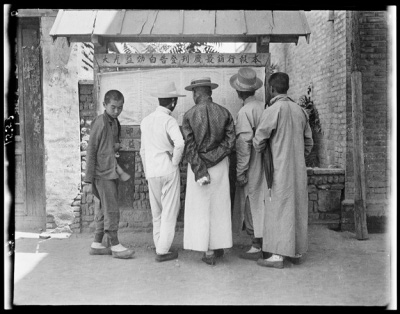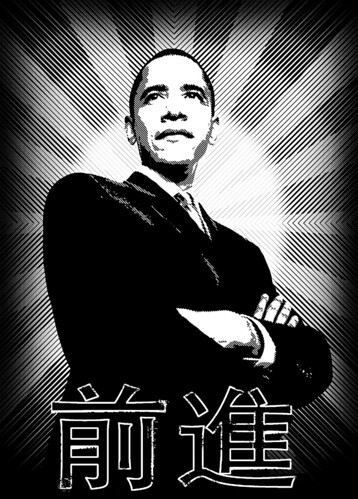
From the New York Times, February 8, 1912:
CHINAMAN A JOURNALIST NOW: Anyway, He Has a Degree from the University of Missouri That Says So.
Colombia, Mo., Feb. 7, – Hin Wong, who is said to be the first Chinese to receive a degree in journalism, finished his work at the University of Missouri this week and left for New York, where he will remain with his father, a tea merchant, for a short time before going to China. Wong says he will do his part in the formation of a new republic, although he will not accept a government position, which has already been offered to him. He expects to help the unfortunate classes among his people by giving publicity to their condition.
Wong has been engaged as correspondent by a New York newspaper, and will write articles for Chinese papers. He will devote all of his time to acquainting his own people with the actual conditions among the poor of China and their reasons for discontent.
“It is a field of work that has never been attempted in China,” said Wong. “It was my main reason for coming to America to study journalism.”
Less than three months later:
GOES TO AID OF SUN YAT-SEN.; Hin Wang, Columbia Student, Has Received a Call to China
Hin Wong, a Chinese student of Columbia and a trained journalist, left for China yesterday after receiving a call from Dr. Sun Yat-Sen, former Provisional President of China, to join him in achieving the social regeneration of South China. Wong is a graduate of the School of Journalism of the University of Missouri, and has been studying at Columbia for the Consular Service. Wong will be one of several young Chinese educated abroad to assist Dr. Sun in the industrial development of South China.
On April 4 Dr. Sun in a interview at Shanghai said that he had finished the political revolution and was to “commence the greatest social revolution in the world’s history,”adding that in his work he will rely mainly, as in the political revolution, “on our trained young blood.” Then he sent messages to Europe and America for his assistants to return and meet him in Canton as soon as possible.
Mr. Wong was educated in Hawaii, where his father was a Presbyterian minister and a publisher. It was in his fathers printing office that he grew to love newspaper work. In 1907 at his fathers behest he went to the St. Louis Bible College to study for the ministry. There he supported himself by reporting for the newspapers, which rekindled his longing to be a newspaper man. The next year he gave up the ministry and matriculated in the School of Journalism at the University of Missouri.
In 1910 Mr. Wong came to Columbia and took courses in diplomacy and consular service. While here he helped organize the Chinese Presbyterian Church, and although 25 years of age, became its elder. Then he formed the squad of Chinese Boy Scouts, founded a school to teach the coolies of Chinatown, became news editor of the Chinese Monthly, and President of the Chinese Students Club.
One of the tasks Mr. Wong carried out was in bringing about peace between the fighting tongs in 1911, and a no less conspicuous success was the management of a fair for famine relief, when thousands upon thousands of tourists visited Chinatown and poured money into the Chinese Red Cross fund. Mr. Wong’s last interest in New York was the agitation among the Chinese merchants to have the old Joss House torn down and replaced with a fully-equipped YMCA Building. His sudden departure for China necessarily leaves this work in other hands.
In Canton, his native home, Mr. Wong expects to relieve the poor by the most scientific means known. After a thorough investigation of the social conditions in a tour which he will make with Dr. Sun and his colleagues, a socialistic scheme is to be tried. Several factories are planned in which capitalists and laborers will share equally in the profit. Then large public works are to be undertaken to give the unemployed work for several years unti they have learned different trades.
Before Mr. Wong left for the West, he said: “We have our political freedom; it remains now to secure our economic independence. It was the realization of the utter impossibility of alleviating the awful conditions of the poor that drove Dr. Sun, twenty-five years ago, to strike at the sole obstacle – Manchu corruption and incompetency.
Hin Wong would go on to help famed China Hand Carl Crow, as well as John B. Powell, whose son John W. Powell would continue to publish the China Weekly Review (and was even tried for sedition by the U.S. for printing Chinese allegations of germ warfare in 1952), which employed Edgar Snow and Arthur Ransome among others.
Hin Wong would later appear at the Press Congress of the World in 1921, according to Timothy Weston’s paper “Newspapers, Journalism and China’s Entry Into the World in the Era of the First World War”:
As Hin Wong, editor of the Star of Canton, stated: “Much injustice has been done to China because of ignorance of Chinese conditions on the part of foreigners… Much misconception regarding things Chinese exists, and it is high time that definite steps should be taken by Chinese and others interested to bring to the attention of the world the existence of a great people with incalculable natural resources capable of bringing peace, prosperity, and happiness to mankind if properly developed and appreciated or curse and war to the world if misunderstood and mistreated.” Hin Wong and his colleagues desperately wanted China to take, and to be permitted to take, its rightful place among the world’s leading nations. They understood that they had a sympathetic audience at the Press Congress and hoped the journalists assembled there would convey what they had to say to their home countries.
By speaking out in this way the Chinese participants were both appealing to the publics in the world’s leading nations and warning them that Chinese public opinion was growing more nationalistic in a way that portended future conflict if foreigners could not learn to treat China more fairly.
Wow. That sounds familiar.
(H/t to Granite Studio for reminding me I used to do this)
Photo from the Sidney Gamble Collection at Duke.


